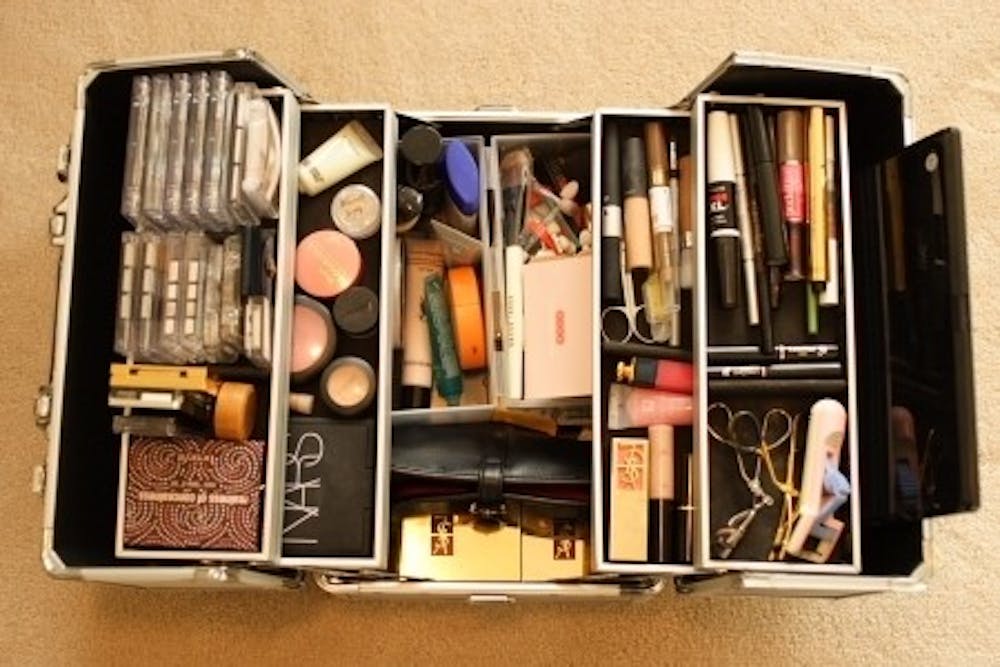I used to think that I wore makeup to make myself feel good. But when I realized I was afraid to leave my dorm room with a bare face, I had to admit there was something else going on.
Every morning, I cover my skin in foundation, fill in my eyebrows, dust my cheeks with some blush and bronzer, and run a mascara wand through my eyelashes. I call it “putting on my face.” I never consider leaving my dorm without wearing any makeup.
I have struggled to reconcile my reliance on makeup with my feminist ideals for years. How could I claim opposition to patriarchal beauty norms while actively perpetuating them? But in actuality, feminists make that job pretty easy.
When asked why they wear makeup, most feminists will say that makeup is a form of empowerment. And for many women, this is true—makeup is merely a tool to enhance both their physical appearance and their confidence. In fact, putting on makeup can be very enjoyable, even a form of self-care. I know that when my eyeliner is sharp, I feel like I can take on the world.
The problem comes when your made-up face is the rule rather than the exception. I no longer put on makeup to look beautiful—I put on makeup to look normal. Because so few people have seen me without makeup, not wearing it feels like choosing to show the world an inferior Rebecca. My bare face is no longer me, but rather, a subpar version of the self I’d prefer to see in the mirror.
In the past, I too have responded to questions about the sexist undertones of makeup by expressing how much I enjoy it. I assumed that, because makeup is feminist for some, it was also feminist for me.
But that’s not the whole story. If I felt adequate without makeup on, I surely wouldn’t wear it every day. Nor would I be so terrified of my friends catching a glimpse of my imperfect skin. By asserting makeup as a feminist activity, I can shamelessly validate the choice to reinforce my insecurities and unconsciously comply with patriarchal norms.
My insecurities are only intensified by the media, which is a constant reminder that my worth is determined by my appearance. Particularly, that I am only valuable to men if I am pretty. There was a joke which became popular a few years ago that has stuck with me—“take your girl swimming on the first date.” You know, so her makeup washes off and you can make sure she’s not actually hideous.
The implication here is that that being unattractive by conventional standards strips women of their value. Even the women we consider the most beautiful aren’t exempt from this criticism. Female celebrities who choose not to wear makeup are “brave” at best and “secretly ugly” at worst. And society has taught us that, as women, being ugly is one of the worst things you can be. Is it any wonder that we will avoid those judgments at all costs? Even if it means wasting our time, money and energy on a routine that we lie and say we do simply because we want to?
The claim that makeup is a form of feminism or an instrument of the patriarchy is too black and white. Such a statement consciously ignores the beauty industry’s power over the female reality, as well as the vicious ideals it imposes from a young age. There are thousands of businesses that profit from the insecurities of women who have been implicitly convinced that they will be worth more if they are prettier. Our faces are currency, and the more we are envied for our beauty, the more our value inflates. If we cannot profit from our natural beauty, we can profit from the substitute layer of physical beauty that makeup provides.
Makeup is surely empowering for some. But for most of us, it’s both a form of elevation and suppression. We like to look better in part because we know society will respond more positively to us if we do.
I wish the moral of this story was that I have decided to stop wearing makeup. But the truth is, I’m still too scared. However, I’m going to stop claiming that my use of makeup is not a problematic choice. I recognize the sexist standards being lobbied against me, even if I can’t yet dare to rebel against them.
If you can truly say that you wear makeup only to show off your beauty rather than to hide behind it, more power to you. But I’d bet that, when you look at your made-up face in the mirror, your reaction results from more inherently sexist norms than you’d like to admit.
Rebecca Torrence is a Trinity sophomore. Her column runs on alternate Wednesdays.
Get The Chronicle straight to your inbox
Signup for our weekly newsletter. Cancel at any time.

